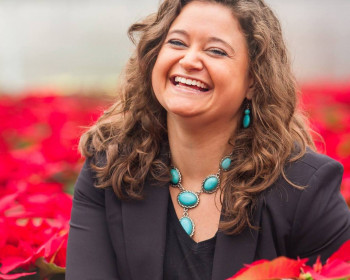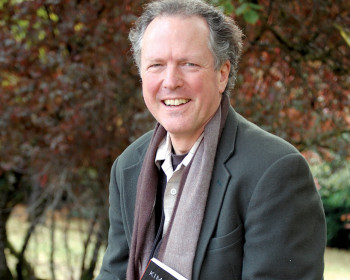Welcome Dolly Nguyen
We are pleased to welcome Dolly Nguyen, PhD, Assistant Professor in Educational Leadership.
Open gallery

We are pleased to welcome Dolly Nguyen, PhD, Assistant Professor in Educational Leadership.
What prior experience do you bring to this new position?
Prior to Lewis & Clark College, I was a research associate for the Institute for Immigration, Globalization, and Education (IGE) and Project Manager for the National Commission on Asian American and Pacific Islander Research in Education (CARE) at the University of California, Los Angeles (UCLA). IGE and CARE conduct research at the axis of scholarship, practice, and policy. Aligning with that aim, I managed projects that intersect all three sectors, such as an ACT-funded project entitled, The Racial Heterogeneity Project (RHP). RHP which brings together scholars from across disciplines to conceptualize a framework and discuss actionable steps for organizations, institutions, and states to improve data practices and more accurately capture and represent the nation’s racial and ethnic diversity. The RHP resulted in a national report and has been discussed in a broader forum via ACT’s Center for Equity in Learning blog. The work of RHP was applied to my contributions to the Washington State Race & Ethnicity Student Data Taskforce, which provided recommendations for the expanded collection or racial and ethnic data in all K-12 public schools starting the fall of 2018. I look forward to bringing the intersection of scholarship, practice, and policy into my new role at the Lewis & Clark Graduate School of Education and Counseling in both my research agenda and into the classroom space.
How do you see yourself contributing to the work and mission of your department and the Graduate School as a whole?
My personal and professional aims of mitigating inequality through stimulating teaching and rigorous research align well with the GSEC’s mission and values of promoting social action through discussion and inquiry, and the Educational Leadership Department’s commitment to social justice and equity. Beyond those shared values, I have quickly learned that the heart of GSEC’s commitment to equity lies in its openness to discussion and its pledge to action – two aspects to which I can contribute my experiences, knowledge, successes, and failures.
What drew you to the Lewis & Clark Graduate School of Education and Counseling (GSEC)?
The most obvious reason is the mutual alignment of values and mission, but what drew me was something less evident. I was drawn by the opportunity to equally contribute and to learn. This characteristic that I observed during my campus visit is affirmed each class meeting. While the intent of campus visits is to demonstrate my possible contribution to the School, I also realized that there was much to learn from my colleagues, peers, and students. The bi-directional exchange of ideas was a key factor in my desire to be at Lewis & Clark College.
What work and projects lie immediately ahead of you upon your arrival at GSEC?
First, I will focus on revising my dissertation, Hidden Configurations of Inequality: A Multilevel Analysis of Ethnic Stratification across the Postsecondary Pipeline, which investigates racial gaps in college enrollment, transfer from two-year to four-year and degree attainment. Utilizing a unique statewide longitudinal dataset that tracks students from the time of entry in K-12 to the point of exit in postsecondary education, the study focuses on the aspects of students’ backgrounds and experiences that promote and hinder success at each transition in their postsecondary trajectories. The findings are drawn from disaggregated racial data by ethnicity, which speak to the significance of examining racial heterogeneity when considering inequality. Furthermore, the study examines inequality across the educational pipeline – a necessary perspective for understanding the temporal (i.e., persistent) aspect of inequality. The study will be revised into journal publications.
Additionally, as the recipient of the Center for Minority Serving Institutions (CMSI) fellowship, I will be conducting a study that explores the early adoption processes of two newly-funded Asian American and Native American Pacific Islander Serving Institutions (AANAPISIs). The study seeks to answer the questions: 1) How can MSI status be institutionalized within college structures to sustain the benefits of the designation? and 2) To what extent do institutions have to become racialized in order to sustain the benefits of MSI status? In answering these questions, the study will contribute a greater understanding to the extent it takes to integrate, embody and institutionalize MSI status into the larger college structure, and the challenges to institutionalization and sustainability.
How do you foresee this position challenging you professionally?
As a faculty member within the Educational Leadership Department, I foresee ongoing and challenging, conversations about how to extend our work – teaching, research, community engagement – across the educational pipeline. While it is easy to use the phrase “educational pipeline,” conducting meaningful work that actualizes longitudinal perspectives is a much greater feat. I welcome this challenge and look forward to engaging with the faculty and staff in the Educational Leadership Department on advancing our knowledge about the persistence of inequality and considering the ways in which it can be mitigated in each sector of education, and across those sectors.
What do you find especially unique about the graduate school and/or what do you see as its greatest asset?
I worked at the Lewis & Clark GSEC as a staff member to the Counseling Psychology Department before my graduate school tenure. During my time as a staff member, I led an activity during a GSEC faculty and staff meeting. Upon reflecting on that opportunity, it occurred to me that the GSEC exhibits an environment of engagement that exceeds most traditional academic spaces. What follows the GSEC’s assertion of an openness to dialogue is an actual openness to dialogue, and with that, a sincerity to social action through engagement. This is the GSEC’s greatest asset.
I am incredibly fortunate to have joined the faculty and staff at the GSEC given our mutual aims and values. Furthermore, this move represents a homecoming, as my family and support system live just one bridge away in Vancouver, WA. I am also delighted to be coming home to, in my opinion, one of the greatest food cities.
Graduate Communications is located in room 205 of Rogers Hall on the Graduate Campus.
voice 503-768-6054
fax 503-768-6053
Graduate Communications
Lewis & Clark
615 S. Palatine Hill Road
Portland OR 97219

